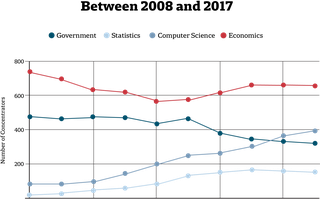Things have gotten so bad in the Government department that they have called in the big guns to do the recruiting. All over campus, posters have popped up with Uncle Sam instructing students that “the top ranked government department in the U.S. wants you!”
This December, 125 members of the Class of 2010 registered as Government concentrators, a drop from 164 concentrators in the Class of 2009 and dramatically lower than the 236 concentrators in the Class of 2008. In sum, the College’s political scientists have seen a 48 percent decrease in the students who fill their lecture halls and seminar rooms over the last three years, leaving department administrators searching for answers.
“We’re not sure, to be perfectly honest,” said Timothy J. Colton, director of the undergraduate studies for Government, in trying to explain the student flight from the department.
Further confusing administrators is the fact that the concentrations into which students would be expected to fall haven’t seen their numbers increase appreciably. While History has picked up students over the past three years, Economics has lost a few and Social Studies has seen a 14 percent drop, according to figures available through the Harvard College Facebook.
LOOKING FOR ADVICE
According to students and professors, one of the leading reasons for the shrinking concentration size is the perceived weakness of the department’s advising.
“We get feedback from students that they don’t get enough personal attention in government,” Colton said.
William M. K. Stallings ’10, who planned to concentrate in Government before ultimately deciding on Social Studies, said that there is a big difference in the advising that the Government department offers compared to the advising in other concentrations.
“It’s not just the number of students,” Stallings said. “I think it’s a commitment issue.”
The lack of strong advising can be particularly difficult for students hoping to write an honors thesis.
“I think we’ve pretty much reached consensus on the fact that we don’t do enough for honors concentrators,” Colton said.
He added that while the numbers indicate that students in the past have been unhappy with the concentration, he hopes that this problem would be at least partially addressed by the recent hiring of a full-time director of undergraduate studies and a full-time concentration advisor.
“We’re not giving enough by way of comprehensive advice, and this is what they will be doing,” Colton said about the new hires.
For Stallings, part of the decision not to major in Government came as a result of what he felt was a restrictive teaching style in Government classes.
“You couldn’t deviate from a specific writing style,” he said of his experience writing papers in Government class. “If you tried to come up with anything novel, it was rejected.”
Government professor Jennifer L. Hochschild suggested that students might be finding other concentrations that appeal to them.
“It’s possible that some students were Government concentrators as a default,” Hochschild said. “If they’re finding a smaller concentration that better suits their interests, maybe that is good for everybody.”
Still, even Hochschild did not excuse the department entirely.
“If, alternatively, fewer people are concentrating in Government because we’re not offering enough courses or they had a bad experience, that’s bad for us,” she said.
According to a survey done by The Crimson at the end of last year, Government concentrators are less satisfied with their major than students studying in almost all other Harvard departments. When members of the Class of 2007 were asked to rank their concentrations on a 5-point scale, Government ranked second lowest, slightly ahead of Biology.
DINING WITH GOV DOCS
In addition to the “Uncle Sam” flier, the department has sent professors to dinners at many of the houses in order to talk to students about concentrating in Government,
Similarly, the department plans to host “Super Tuesday” events in some of the houses tomorrow as voters in 24 states vote in presidential primaries.
The department has also recently made changes in its curriculum as well: for the first time this year, students only have to take a one-semester sophomore tutorial, instead of a year-long class. They can choose either a course on American government or one on comparative politics and international relations.
The department will have to wait another year to see if the new push has a positive effect on its depleting numbers.
“Personally, I do expect it,” Colton said. “But in the end that’s up to the students. They get to choose at this level, and all we can do is present the best possible product, and in the end it’s up to them to decide.”
In the meantime, they’ve still got Uncle Sam.
“It can’t hurt. I don’t think students decide on a concentration based on an ad, but more information is a always better than less information,” Hochschild said.
—Staff writer Lauren D. Kiel can be reached at lkiel@fas.harvard.edu.
Read more in News
Facebook Grants Deletion PermissionRecommended Articles
-
The Search for AdviceAs a joint concentrator in Women, Gender, Sexuality (WGS) and government, the experience Christina Ahn ’05 had with advising offered
-
Low Ranks for Large FieldsSeniors in Harvard’s largest departments—economics and government—are less satisfied with their concentration experience than their classmates in less crowded fields.
-
A New Course for GovernmentDespite its recent less-than-subtle advertising blitz, the Government department has found itself with a dramatically reduced number of concentrators as
-
New Chair To Lead Government Dept.Government Professor Timothy J. Colton has been appointed chair of the Government Department, replacing Nancy L. Rosenblum ’69 to lead about 50 professors and the second largest group of undergraduate concentrators.
-
 Amid Decline in Popularity, Harvard Government Department Turns to New Data and Tech Programs
Amid Decline in Popularity, Harvard Government Department Turns to New Data and Tech Programs













